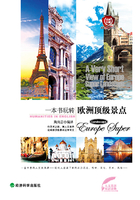
第7章 特色城市——解读历史灵魂笼罩下的欧洲文明(7)
In the 15th century, Florence was guarded by the Medici family, a localmagnate. The guardian lasted 300 years.The Medici family's crest also became today's city emblem of Florence.The 300 years of history of Florence from the 15th century to the mid 18th century, can be described to be closely bound up with the Medici family's rise and fall.
Florence's most glorious moment was the period of the renaissance. The Medici family had a strong love of art.Under its protection and support, there were lots of famous persons gathered in Florence, such as Leonardo da Vinci, Dante, Galileo, Rafael, Michelangelo, Tiziano, etc.They created a lot of buildings, sculpture and painting works shining the light of the Renaissance.So Florence became the birthplace of the European Renaissance, as well as the center of European art, culture and thought.
英语Florence,意大利语Firenze,以前汉语曾译为“翡冷翠”。意大利语的直译为“百花之城”,市花以及标志是一朵紫色的百合。“翡冷翠”由中国现代著名诗人徐志摩首译,比另一个译名“佛罗伦萨”来得更富诗意,更多色彩。
佛罗伦萨是一座具有悠久历史的文化名城。传说,佛罗伦萨最早兴建于罗马共和国凯撒在位时期,公元前59年,佛罗伦萨成为罗马的殖民地,后又被伦巴第人统治。13世纪时,因羊毛和纺织业的迅速发展而撅起,成为当时意大利重要的城市。
15世纪时,佛罗伦萨被当地的巨商美第奇家族所守护,这一守护就是300年,而美第奇家族的族徽也成了今天佛罗伦萨的市徽。15世纪至18世纪中期,长达3个世纪的佛罗伦萨历史可以说是与美第奇家族的兴衰紧密相连。
佛罗伦萨最为辉煌的时刻,要数文艺复兴时期。美第奇家族酷爱艺术,在其保护和资助下,当时积聚在佛罗伦萨的名人众多,如达·芬奇、但丁、伽利略、拉斐尔、米开朗基罗、提香等,他们创造了大量的闪耀着文艺复兴时代光芒的建筑、雕塑和绘画作品,佛罗伦萨因此成为文艺复兴发源地,以及欧洲艺术文化和思想的中心。
●The Flowering of the Tourist Attractions 百花齐放的旅游胜地
Michelangelo Square 米开朗基罗广场
Michelangelo Square is a famous square with a magnificent panoramic view of Florence, Italy, and is a popular tourist destination in the Oltrarno district of the city. The famous view from this observation point overlooking the city has been reproduced on countless postcards and snapshots over the years.
It was built in 1869 and designed by architect Giuseppe Poggi. At that time, Florence was the capital of Italy and the whole city was involved in an urban renewal.On the right bank, the 14th-century walls were removed and turned into the ring road.On the left bank winding up the hill of San Miniato the Viale dei Colli was built, a tree-lined street over 8 kilometers long ending at the Michelangelo Square which was built as a terrace with a panoramic view of the city.
The square, dedicated to the great Renaissance sculptor Michelangelo, has copies of some of his works found elsewhere in Florence: the David and the four allegories of the Medici Chapel of San Lorenzo.
Poggi designed the loggia in the neoclassical style that dominates the whole terrace, which today houses a panoramic restaurant. Originally it was supposed to house a museum of works by Michelangelo, never realized.In the wall of the balcony, under the loggia, there is an epigraph in capital letters referring to his work: The Florentine architect Giuseppe Poggi turned this into his monument in MCMXI.
米开朗琪罗广场是意大利佛罗伦萨的著名广场,是位于该市奥特拉诺区的热门旅游目的地,从这里可以俯瞰美丽城市全景。这些年来,这个可以俯瞰全市美景的地点,出现在许多明信片和快照中。
这座广场兴建于1869年,由建筑师朱塞佩·波吉设计。当时佛罗伦萨是意大利的临时首都,进行了一项城市复兴计划,在右岸,将14世纪的城墙改建为环形马路;而在阿诺河左岸,圣米尼亚托山8公里长的蜿蜒山路希尔斯大街上,修建了米开朗基罗广场,成为观看城市全景的阳台。
这座广场用以纪念文艺复兴时期的伟大艺术家米开朗琪罗,点缀着一些他留在佛罗伦萨的著名作品的复制品,如在广场中央的青铜大卫像,以及佛罗伦萨圣老楞佐大殿的美第奇小教堂的4个寓言。
波吉设计了广场上控制性的新古典主义风格的凉廊,现在是一座全景餐厅。起初计划在此开办展出米开朗琪罗作品的博物馆,不过此计划未能实现。在凉廊下方阳台的墙上有如下铭文:“佛罗伦萨建筑师朱塞佩波吉,这里是他的纪念碑。”
The Uffizi Gallery 乌费兹美术馆
The Uffizi Gallery is a museum in Florence, Italy. It is one of the oldest and most famous art museums of the Western world.Building of the palace was begun by Giorgio Vasari in 1560 for Cosimo I de'Medici as the offices for the Florentine magistrates.The construction ended in 1581.Over the years, more and more parts of the palace evolved into a display place for many of the paintings and sculpture collected by the Medici family or commissioned by them.
Because of its huge collection, some of its works have in the past been transferred to other museums in Florence—for example, some famous statues to the Bargello. A project is currently underway to expand the museum's exhibition space in 2006 from some 6000 metres?to almost 13000 metres?,allowing public viewing of many artworks that have usually been in storage.Today, the Uffizi is one of the most popular tourist attractions of Florence.In high season(particularly in July),waiting times can be up to five hours.
乌菲兹美术馆坐落在意大利佛罗伦斯,是最有历史及最有名的一座艺术博物馆。乌菲兹美术馆的兴建始于1560年。这里一开始是乔尔乔·瓦萨里为第一代托斯卡纳大公、科西莫一世·德·美第奇所建的办公室。这项工程于1581年完工。多少年来,越来越多的美第奇家族收藏与管理的绘画与雕刻等艺术品都安放与此。
由于馆藏实在太多,一些藏品不得不转移到佛罗伦萨的其他博物馆中。比如一些有名的雕塑作品就被安放在了巴杰罗美术馆。乌菲兹从2006年开始进行扩建工程,扩建之后展馆面积将由6000平方米增至约13000平方米。使得许多过去放在储藏室里的作品得以公开展览。今天,乌菲兹已成为佛罗伦萨最受欢迎的旅游点。在旺季时,尤其是7月间,排队等候进馆的时间会非常久。
Pitti Palace 皮蒂宫
The Pitti Palace is a vast mainly Renaissance palace in Florence, Italy. It is situated on the south side of the River Arno, a short distance from the Ponte Vecchio.The core of the present palazzo dates from 1458 and was originally the town residence of Luca Pitti, an ambitious Florentine banker.
The palace was bought by the Medici family in 1549 and became the chief residence of the ruling families of the Grand Duchy of Tuscany. It grew as a great treasure house as later generations amassed paintings, plates, jewelry and luxurious possessions.
In the late 18th century, the palazzo was used as a power base by Napoleon, and later served for a brief period as the principal royal palace of the newly united Italy. The palace and its contents were donated to the Italian people by King Victor Emmanuel III in 1919, and itsdoors were opened to the public as one of Florence's largest art galleries.
皮蒂宫是一座规模宏大的文艺复兴时期佛罗伦萨的宫殿。位于阿诺河的南岸,距离老桥只有很短的距离。目前的宫殿的核心原本是1458年建造时的一位佛罗伦萨银行家卢卡·皮蒂的住所。
1549年,这个宫殿由美第奇家族购下,并作为托斯卡纳大公的主要住所。通过世代累积皮蒂宫逐渐储藏了大量的绘画、珠宝和贵重的财宝。
后来到了18世纪晚期,皮蒂宫被当做了拿破仑·波拿巴的权利中心,后来统一后的新意大利皇室也曾在此短暂居住。1919年,维托里奥·埃马努埃莱三世把宫殿和藏品一起捐献给意大利人民,现作为佛罗伦萨最大的美术馆对公众开放。